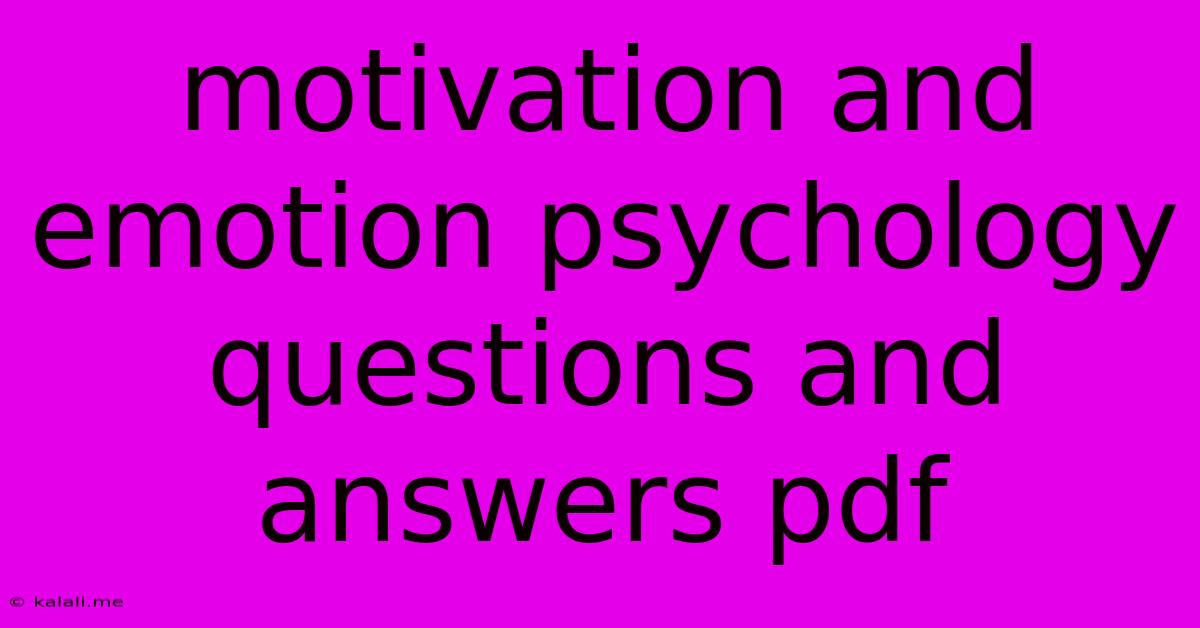Motivation And Emotion Psychology Questions And Answers Pdf
Kalali
Jun 12, 2025 · 4 min read

Table of Contents
Motivation and Emotion Psychology: Questions and Answers
This article explores key concepts in motivation and emotion psychology, providing answers to frequently asked questions. Understanding these fundamental psychological processes is crucial for comprehending human behavior and well-being. This guide serves as a resource for students, researchers, and anyone interested in delving deeper into the fascinating world of human motivation and emotion. We'll cover topics such as the different theories of motivation, the biological and psychological underpinnings of emotion, and the interplay between motivation and emotion.
What are the major theories of motivation?
Several prominent theories attempt to explain the driving forces behind our actions. These include:
-
Drive Reduction Theory: This theory posits that motivation stems from biological needs (like hunger or thirst) creating an internal drive to reduce the unpleasant state of tension. Maintaining homeostasis is key.
-
Incentive Theory: This perspective focuses on external rewards and punishments shaping our behavior. We are motivated to pursue things that promise positive outcomes and avoid those with negative consequences.
-
Arousal Theory: This theory proposes that individuals are motivated to maintain an optimal level of arousal. Too little arousal leads to boredom, while too much leads to anxiety. We seek activities that bring us to our ideal arousal level.
-
Expectancy Theory: This theory highlights the role of beliefs and expectations in motivation. It suggests that motivation is influenced by the belief that effort will lead to performance, performance will lead to rewards, and that the rewards are valued.
-
Self-Determination Theory: This theory emphasizes the importance of autonomy, competence, and relatedness in motivation. Feeling in control, capable, and connected to others fosters intrinsic motivation.
How do emotions influence motivation?
Emotions and motivation are inextricably linked. Our emotional state significantly impacts our drive and persistence in pursuing goals.
-
Positive emotions, such as joy and excitement, often enhance motivation, fueling our desire to engage in activities and pursue challenges.
-
Negative emotions, like fear and anxiety, can either demotivate us, leading to avoidance, or trigger a fight-or-flight response that might increase short-term motivation in specific situations.
The anticipation of future emotional outcomes (e.g., the joy of success or the disappointment of failure) also plays a substantial role in shaping our motivational choices.
What are the biological bases of emotion?
The biological underpinnings of emotion involve several interconnected systems:
-
The Limbic System: The amygdala, hippocampus, and hypothalamus play crucial roles in processing emotions, particularly fear and anger. The amygdala, in particular, is vital for emotional responses.
-
The Autonomic Nervous System: This system regulates physiological changes associated with emotions, such as increased heart rate, sweating, and changes in respiration. The sympathetic nervous system activates the fight-or-flight response, while the parasympathetic nervous system calms the body down.
-
Neurotransmitters: Chemical messengers like dopamine, serotonin, and norepinephrine are implicated in emotional experiences. Imbalances in these neurotransmitters can contribute to emotional disorders.
What are the psychological theories of emotion?
Several psychological perspectives offer insights into how we experience and understand emotions:
-
James-Lange Theory: This theory suggests that emotions arise from physiological responses to external stimuli. We feel fear because our heart races, not the other way around.
-
Cannon-Bard Theory: This theory proposes that emotional experience and physiological responses occur simultaneously, independent of each other.
-
Schachter-Singer Two-Factor Theory: This theory posits that emotions result from a two-step process: first, physiological arousal, then, cognitive interpretation of that arousal based on the context.
How can understanding motivation and emotion improve well-being?
A strong grasp of motivational and emotional processes empowers us to:
-
Set realistic goals: Understanding your own motivational drivers helps you set achievable goals aligned with your values and capabilities.
-
Manage stress and anxiety: Recognizing the physiological and psychological components of stress allows you to develop coping mechanisms.
-
Build stronger relationships: Understanding emotional intelligence helps to foster empathy and improve communication.
-
Increase self-awareness: Paying attention to your emotional responses provides valuable insights into your needs and preferences.
This overview offers a starting point for exploring the complexities of motivation and emotion. Further research into specific theories and concepts will provide a more comprehensive understanding of these crucial aspects of human psychology. Remember that the interplay between motivation and emotion is dynamic and highly individual, influenced by a multitude of factors.
Latest Posts
Latest Posts
-
Which Of The Following Elements Has The Highest Electronegativity
Jun 13, 2025
-
The Speed Of Cpu Is Measured In
Jun 13, 2025
-
Sampling Error Vs Non Sampling Error
Jun 13, 2025
-
What Is The Prime Factor Of 135
Jun 13, 2025
-
What Mountain Range Separates Asia And Europe
Jun 13, 2025
Related Post
Thank you for visiting our website which covers about Motivation And Emotion Psychology Questions And Answers Pdf . We hope the information provided has been useful to you. Feel free to contact us if you have any questions or need further assistance. See you next time and don't miss to bookmark.